Travel through the biblical narrative to uncover the mystery of God's decrees, where divine will and human destiny are intricately woven together.
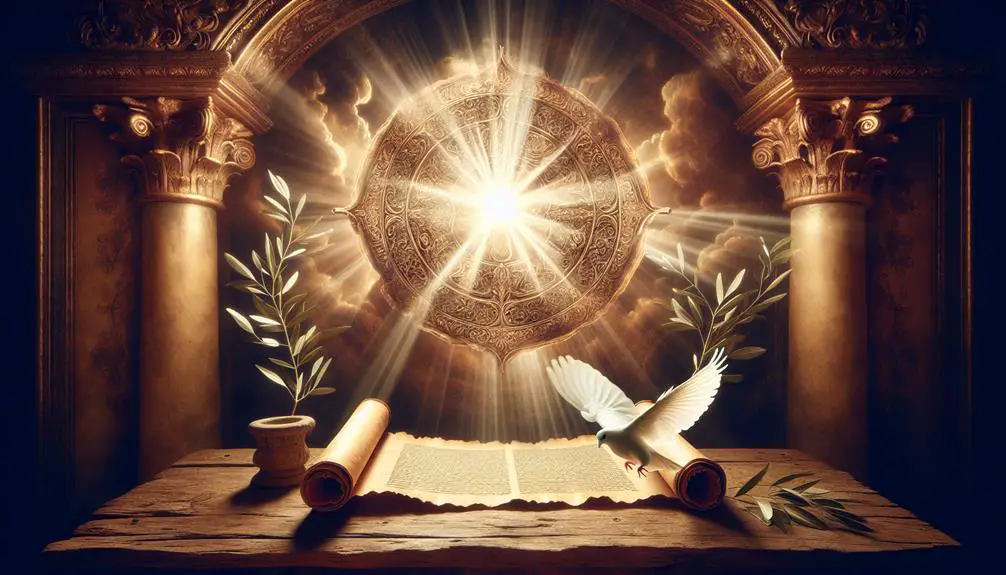
God's Decrees in the Bible
Imagine standing at the edge of a vast ocean, each wave a decree from God, powerful and purposeful, shaping the shore of human history.
You're about to embark on a journey to explore the depths of these divine pronouncements, understanding their nature, how they've sculpted creation, and their role in prophecy and fulfillment.
You'll navigate the intricate relationship between sovereignty and free will, and ponder how these decrees influence redemption and God's will in the lives of believers.
The mystery of predestination awaits, inviting you to ponder its implications in a world where divine will intersects with human freedom.
Key Takeaways
- Divine decrees reveal God's will and command, guiding believers' faith and actions.
- The interplay between God's sovereignty and human free will is a complex theological subject.
- Creation is an expression of God's decrees, showcasing His power and purposeful design.
- Living according to God's decrees involves faith, obedience, and aligning with divine wisdom.
Understanding God's Decrees
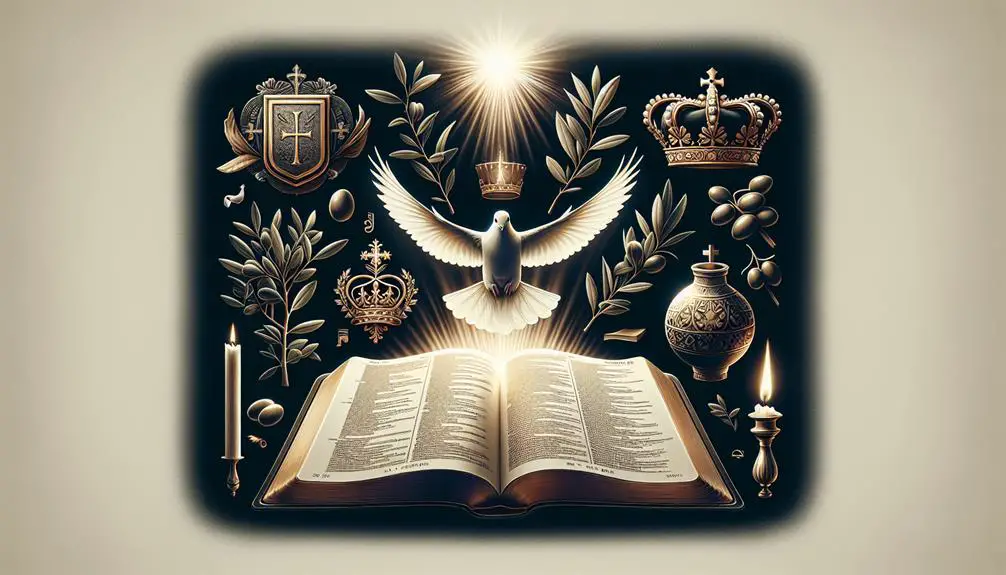
To truly grasp the concept of God's decrees, one must delve into the scriptural context and theological interpretations that define them. Understanding these decrees isn't merely about acknowledging their existence; it's about comprehending their significance and how they align with the overarching narrative of the Bible. The process of decree interpretation requires a nuanced approach, where one appreciates the complexity of divine communication and its implications for humanity.
Decree interpretation is a multifaceted endeavor. You're not just reading text; you're engaging with a divine legislative process that has been communicated through prophets and apostles across millennia. The legislative parallels found in human governance can offer a framework for understanding God's decrees. Just as earthly laws are designed to govern behavior and establish order, God's decrees serve to guide humanity according to His will and purpose. However, the divine decrees transcend mere rules or commands; they embody the character and intentions of God Himself.
In analyzing these decrees, you're invited to reflect on the depth of God's sovereignty and wisdom. Each decree, whether it pertains to the laws given to Israel, the pronouncements of judgment, or the promises of salvation, reveals a facet of God's plan for His creation. You'll find that these decrees aren't arbitrary edicts but are deeply rooted in God's justice, mercy, and love for His creation. Through a scholarly and reflective exploration of God's decrees, you gain insights into the divine character and the profound relationship God seeks to establish with humanity.
The Nature of Divine Pronouncements
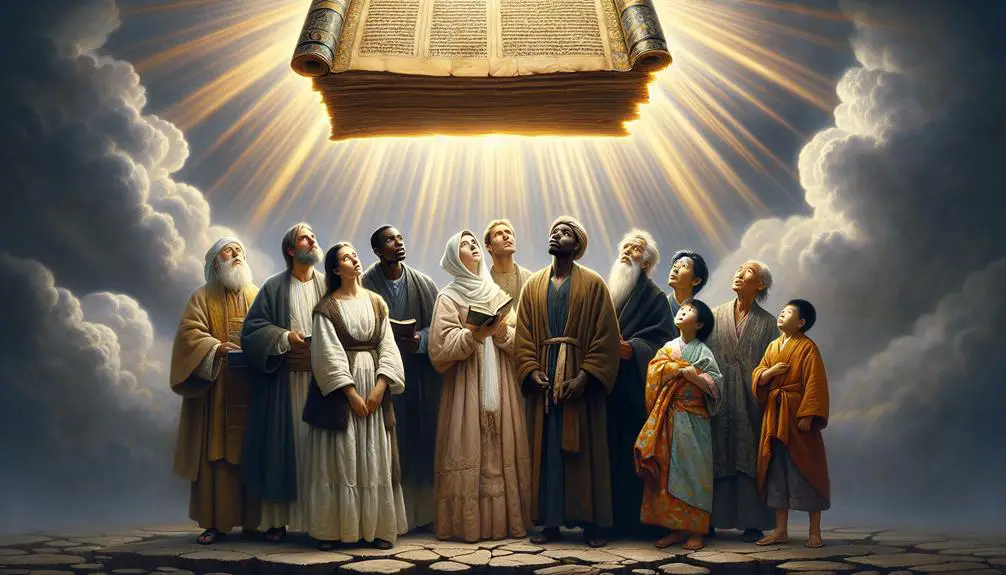
You'll find that defining divine pronouncements is crucial for understanding their essence and implications. These decrees aren't only foundational to theological frameworks but also significantly influence believers' faith and actions.
Reflecting on their nature reveals the profound impact they hold within religious practice and belief.
Defining Divine Pronouncements
Throughout history, divine pronouncements have served as pivotal mechanisms through which the divine will is communicated to humanity, embodying both command and covenant. These declarations, often wrapped in layers of divine ambiguity, require careful interpretation to grasp their full meaning and intent. The nature of such pronouncements is threefold:
- They're inherently multifaceted, allowing for a spectrum of interpretations.
- The context in which they're delivered heavily influences their understanding.
- Their ambiguity serves as a test of faith and a catalyst for deeper reflection.
As you delve into the study of divine pronouncements, bear in mind that the challenge of interpretation isn't an oversight but a deliberate aspect of their nature, inviting you to engage with the divine narrative on a profound level.
Impact on Believers
Understanding the multifaceted nature of divine pronouncements, it's crucial to examine their profound impact on believers' lives and faith journeys. These decrees don't merely guide actions; they shape worldviews, embedding themselves into the ethical fabric of individual and communal lives.
You'll find that the ethical implications of these pronouncements are far-reaching, influencing decisions and behaviors in ways that reflect a commitment to divine standards. Moreover, cultural interpretations of these decrees add another layer of complexity, as believers navigate the interplay between timeless divine commands and the shifting sands of cultural norms.
This interplay often requires you to engage in reflective, scholarly analysis to discern how best to live out these decrees in a way that honors their divine origin while being relevant in diverse cultural contexts.
Decrees and Creation
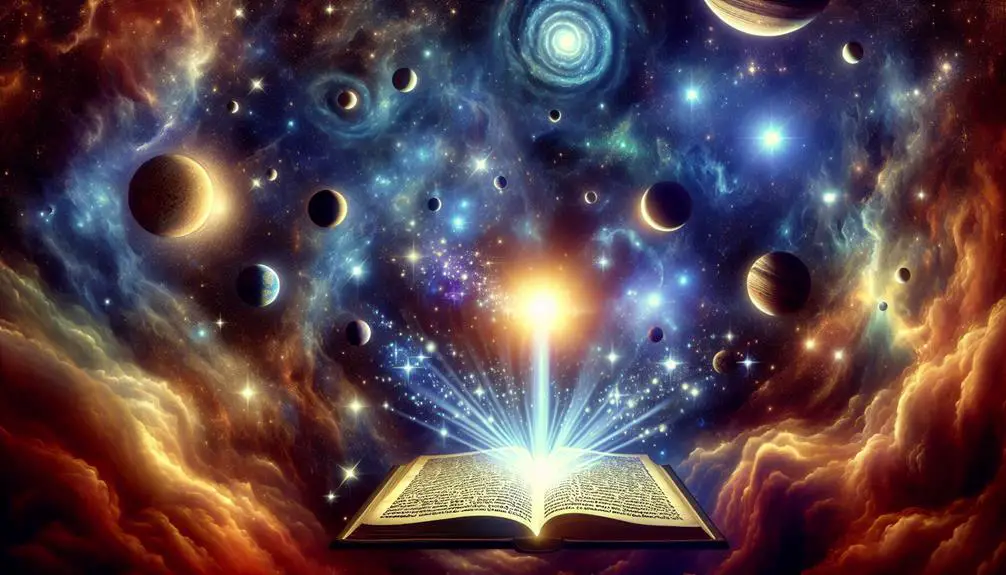
You must consider how God's decrees manifest in the act of creation. His command initiates existence, embedding purpose within the fabric of the universe. This action not only brings forth life but also imposes order on chaos, illustrating a divine orchestration of harmony and complexity.
Reflect on the intricate relationship between decree, creation, and the cosmos's inherent order, inviting a deeper understanding of divine intentionality.
Creation by Command
In the biblical narrative, God's act of creation unfolds through His commanding word, demonstrating a profound interplay between divine decree and the emergence of existence. This cosmic language and vocal genesis reveal:
- The power of speech in shaping reality, where the universe comes into being through spoken decrees.
- The immediacy of God's word, where command instantaneously transitions into creation, underscoring divine omnipotence.
- A framework for understanding existence, where the material world isn't a product of random forces but a deliberate act of divine will.
This reflection on creation by command invites you to ponder the depth of connection between divine intention and the material cosmos, highlighting the meticulous detail and sovereign authority embedded in the fabric of creation.
Purpose in Design
Exploring the decrees and creation reveals a deliberate design, where every aspect of the universe serves a specific purpose, reflecting the meticulous intentionality of the divine will. This design intention unveils a tapestry of purposeful complexity, ensuring that nothing exists merely by chance.
It's as if every star, every creature, and every natural law were crafted with profound deliberation. You're invited to ponder the depth of such planning, where each element plays a role in a grander scheme, contributing to the harmony and sustainability of life.
The idea that everything, from the vast galaxies to the minutest cell, is imbued with purpose challenges us to look beyond the surface, recognizing the divine craftsmanship at work. This perspective shifts how we understand our place within the cosmos, urging us to appreciate the intricate design interwoven through existence.
Ordering Chaos
Having considered the purposeful design of the universe, let's now examine how divine decrees bring order to chaos, setting the foundation for creation itself. This transformation from disorder to order reflects the inherent power and wisdom within these decrees.
Consider the following:
- Chaotic patterns, initially seeming without purpose, reveal a deeper, structured randomness upon closer examination.
- Divine intervention transforms these patterns, guiding them towards a harmonious and purposeful existence.
- The resulting order isn't a suppression of chaos but a reorganization, showcasing both the beauty and necessity of initial disorder.
This process highlights the sophistication of divine decrees, where what appears as randomness is, in fact, a canvas for creating complexity and life. Through this lens, the initial chaos isn't merely a void but the raw material for divine creativity and structure.
Prophecy and Fulfillment

The dynamic interplay between prophecy and fulfillment within biblical narratives reveals the meticulous unfolding of God's decrees across time. This relationship not only underscores the sovereignty of the divine but also offers a lens through which you can understand the historical accuracy and modern implications of these ancient texts. As you delve deeper, you'll find that prophecies aren't mere forecasts; they're divine promises woven into the fabric of history, awaiting their moment of realization.
This intricate dance between what was foretold and what's come to pass challenges you to consider the reliability of biblical prophecy. Historical events, as recorded within and outside the Bible, often align with these prophecies, lending credibility to the scriptural accounts. It's this alignment that compels scholars and believers alike to reflect on the authenticity and divine inspiration of the text.
Moreover, the fulfillment of biblical prophecies isn't confined to the past; it has profound modern implications. It suggests that the scriptures continue to be relevant, offering guidance and insight into the unfolding of human history and the persistent presence of the divine in worldly affairs. This ongoing relevance invites you to ponder the ways in which ancient prophecies continue to inform contemporary faith, ethics, and understanding of divine purpose.
In navigating the complexities of prophecy and fulfillment, you're engaging with more than historical curiosities. You're grappling with the very essence of faith, the interpretation of divine will, and the ongoing dialogue between the past, present, and future.
Sovereignty and Free Will
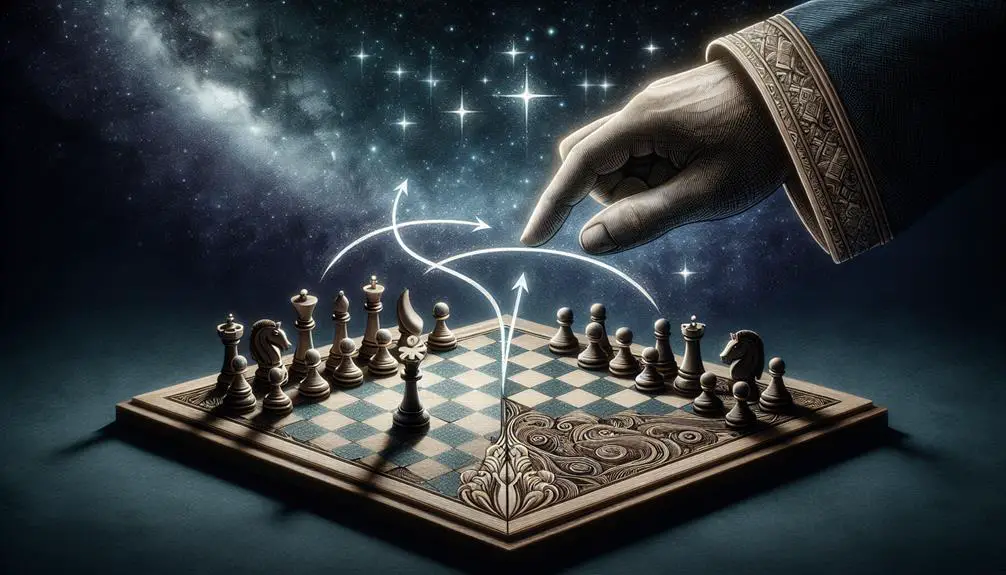
Reflecting on the interplay between prophecy and fulfillment nudges you towards a deeper consideration of God's sovereignty and the enigmatic concept of free will within the biblical narrative. This juxtaposition presents a deterministic paradox that challenges the very core of theological discourse. How does the Bible reconcile God's absolute control with humanity's capacity for choice? The tension between these concepts isn't just a theological riddle but a pivotal aspect of understanding divine-human interaction.
- Deterministic Paradox: The Bible presents God as sovereign, orchestrating events from the dawn of time. Yet, it simultaneously upholds the notion that individuals possess the autonomy to make choices. This dichotomy suggests a complex relationship between divine decree and human freedom, where God's sovereign will and human free will coexist in a manner that defies simplistic explanations.
- Choice Accountability: Scripture underscores the responsibility that comes with freedom. Individuals aren't mere puppets but are held accountable for their actions. This responsibility implies a level of autonomy and choice, suggesting that while God's sovereignty is comprehensive, it doesn't negate the reality of human decision-making.
- Theological Reflection: Engaging with this topic requires a nuanced understanding of biblical themes. It prompts you to wrestle with questions about the nature of God, the essence of humanity, and the interplay of predestination and free will. These reflections aren't merely academic but touch on the heart of faith and the mystery of divine interaction with the world.
In exploring sovereignty and free will, you're invited into a rich tapestry of theological thought, where the mysteries of God's decrees and human agency are woven together in the biblical narrative.
The Decrees and Redemption
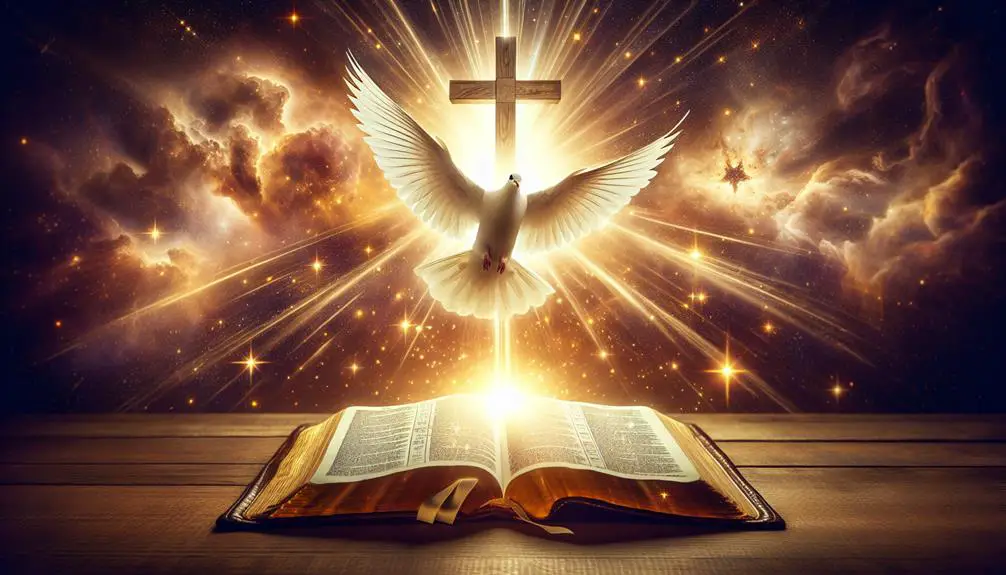
In exploring God's decrees, one cannot overlook the critical role they play in the narrative of redemption, where divine sovereignty intersects profoundly with human history. This intersection is where the election debate and redemption scope find their battleground. You'll see that this isn't just about predestination but about how God's overarching plan for redemption involves specific choices and outcomes, firmly rooted in His decrees.
The redemption scope is vast, encompassing all of creation, yet it's discerningly selective, highlighting the election debate's complexity. It's here, in the heart of redemption's narrative, that God's decrees illuminate the path from creation to consummation. They reveal a God who is both sovereign and intimately involved in the redemption story.
Aspect |
Description |
Implication |
|---|---|---|
Divine Sovereignty |
God's ultimate authority and control over the redemption narrative. |
Assurance of redemption's ultimate fulfillment. |
Human Responsibility |
The role humans play within God's decreed plan for redemption. |
Encourages active participation in faith. |
Election |
God's choosing of individuals or groups for specific roles in redemption. |
Central to the election debate. |
Redemption Scope |
The extent and limits of redemption's reach according to divine decrees. |
Defines the boundaries of salvation. |
Historical Fulfillment |
The manifestation of God's decrees in human history. |
Validates the truth of divine sovereignty. |
Reflecting on these aspects, you're invited to delve deeper into understanding how God's decrees not only establish the groundwork for redemption but also actively shape its unfolding. This analytical journey offers a richer comprehension of the divine narrative and our place within it.
God's Will in Believers' Lives
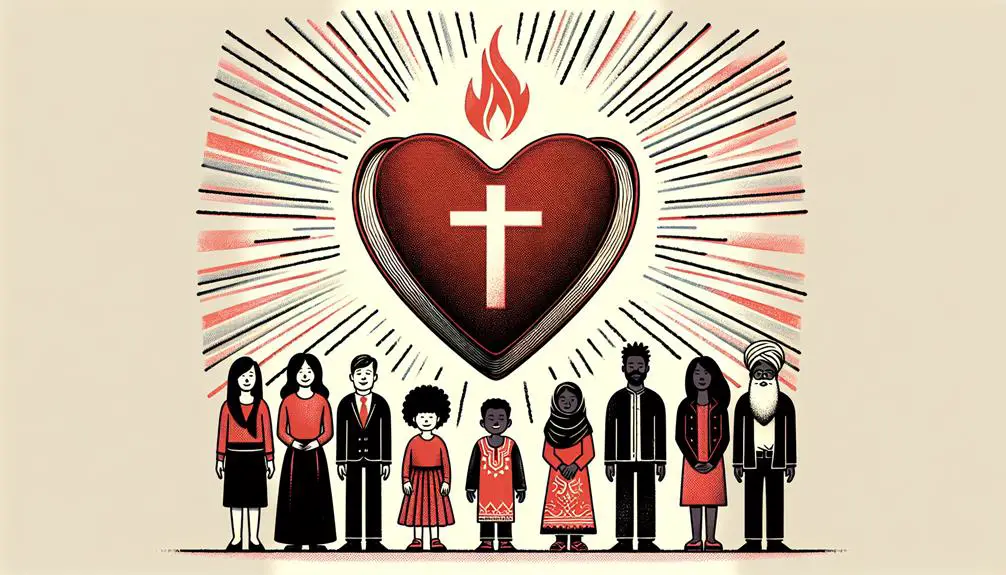
God's will actively shapes believers' lives, guiding decisions and molding character in alignment with divine intentions. As you delve into the Scriptures, it becomes evident that this molding process isn't passive; it's a dynamic interaction between the divine will and human response. This relationship is foundational to understanding how believers can align their lives with God's decrees.
Consider the role of personal prayer in this dynamic. Prayer isn't just a ritual or a wish list; it's a crucial means through which you engage with God's will. Through prayer, you're not just seeking to align your will with God's, but you're also opening yourself up to the transformative power of divine guidance.
Spiritual growth is another key aspect of understanding God's will in your life. This isn't about acquiring knowledge for knowledge's sake but about deepening your relationship with God. As you grow spiritually, your desires start to reflect God's desires more closely, making it easier to discern and follow His will.
In reflecting on God's will in believers' lives, consider these key points:
- *Personal prayer* is a vital tool in aligning your will with God's.
- *Spiritual growth* enhances your ability to discern and embrace God's will.
- The pursuit of aligning with God's will is a *lifelong journey*, not a one-time decision.
Understanding God's will in your life requires patience, humility, and a deep commitment to spiritual practices. It's a journey that continually shapes your character, molds your desires, and guides your decisions, always aiming to reflect the divine intentions more accurately.
Navigating the Mystery of Predestination
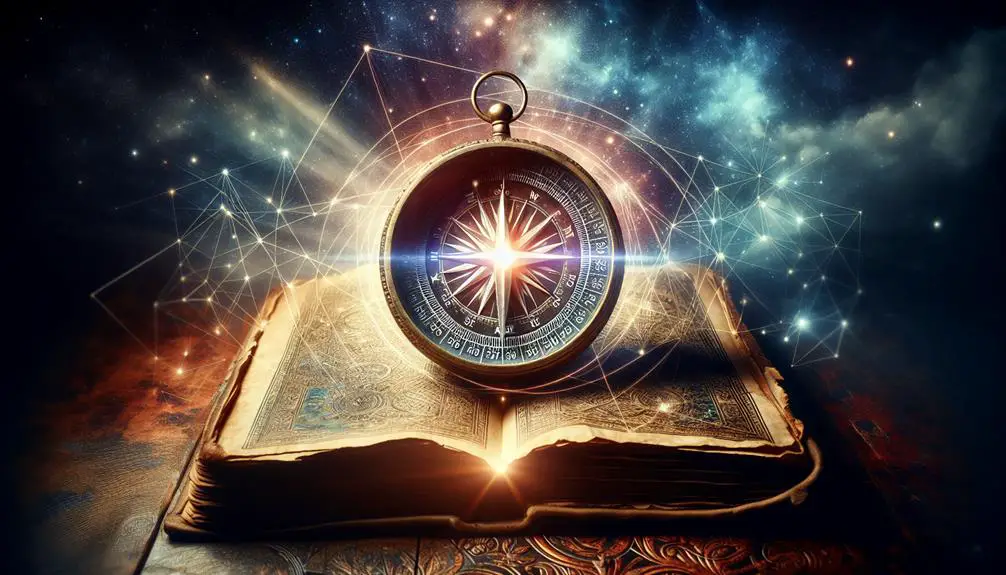
As we explore the dynamic relationship between human will and divine guidance, it's crucial to confront the complex doctrine of predestination, a concept that has puzzled theologians and believers alike. This doctrine raises profound questions about human autonomy and the ethical implications of divine sovereignty. How do you navigate the tension between believing in a God who is in control and maintaining the importance of human freedom and responsibility?
Predestination suggests that God has foreordained everything that happens, including those who will be saved. This understanding can challenge your sense of agency and the meaningfulness of your choices. Yet, it's essential to consider the richness and diversity within theological interpretations, acknowledging that predestination doesn't negate human autonomy but interacts with it in a mystery beyond full human comprehension.
Reflecting on this, consider the following table to understand the balance better:
Aspect of Life |
Influence of Predestination |
|---|---|
Moral Choices |
Guides but doesn't dictate |
Life's Direction |
Sets a path, yet allows detours |
Relationship with God |
Defined but dynamic |
Understanding of Freedom |
Free within a divine framework |
Ethical Decision-Making |
Informed by, not determined by, predestination |
This table underscores that predestination and human autonomy are not mutually exclusive but are parts of a larger, divine tapestry. The ethical implications of this are significant; they suggest that while the ultimate outcomes might be part of God's sovereign plan, the choices you make and the paths you follow matter deeply. This perspective invites you to live responsibly and purposefully, embracing your role within God's broader narrative.
Frequently Asked Questions
How Do God's Decrees Relate to the Concept of Time, Especially Considering the Human Understanding of Past, Present, and Future?
You're diving into how decrees intersect with time, sidestepping temporal paradoxes by embracing the concept of the 'Eternal now.' This notion suggests that past, present, and future are simultaneously present in a single, timeless existence.
Reflecting on this, you're challenged to rethink human perceptions of time, considering that what seems linear to us might be a singular, divine moment.
This perspective invites a profound reevaluation of our understanding of time and destiny.
In What Ways Have Different Cultures and Religions Outside of Christianity Interpreted or Acknowledged the Concept of Divine Decrees?
Exploring diverse cultural perceptions and religious syncretism, you'll find that divine decrees are interpreted in myriad ways across different faiths. These interpretations reflect a deep engagement with the mysteries of existence, often blending ideas to form unique perspectives on destiny and divine will.
As you delve into this analysis, consider how these views enrich our understanding of spirituality, offering reflective insights into how various traditions conceive the divine's influence on the cosmos.
Can God's Decrees Be Seen in the Natural World, and if So, How Do They Manifest Outside of Human History and Salvation Narrative?
You might find it intriguing that 71% of Earth's surface is water, showcasing a cosmic pattern and balance critical to life. This natural design hints at a divine orchestration beyond human history.
Observing environmental stewardship, you'd see how ecosystems thrive under precise conditions, reflecting a larger decree at work. It's a reflective journey, understanding these patterns as possibly divine, encouraging a deeper appreciation of the world's intricacies and our role within it.
How Do the Arts (Literature, Music, Painting, Etc.) Reflect or Interpret God's Decrees Throughout History?
You'll find that the arts have long been a canvas for reflecting or interpreting divine inspiration. Throughout history, artists have used literature, music, painting, and more to explore and express their understanding of the divine.
This artistic freedom allows for a wide range of interpretations, from literal to abstract, giving us a rich tapestry of how humanity perceives and interacts with the concept of a higher power or divine decrees.
Are There Any Scientific Theories or Discoveries That Parallel or Contradict the Notion of God's Decrees, Especially in the Context of Creation and the Universe's Laws?
Exploring scientific theories, you'll find quantum mechanics and evolutionary biology often challenge traditional views on creation and the universe's laws.
Quantum mechanics, with its unpredictable outcomes and particle behavior, contrasts sharply with the notion of a preordained universe.
Meanwhile, evolutionary biology provides a naturalistic explanation for life's diversity, potentially contradicting the idea of a special creation.
Both fields invite deep reflection on the nature of existence and our understanding of it.
Conclusion
In navigating the tapestry of divine decrees, you're not merely tracing the outlines of fate but engaging with a cosmic dance of will and purpose. Here, in the interplay of sovereignty and free will, you find yourself at the crossroads of destiny and choice.
God's pronouncements, like celestial music, guide the universe's rhythm, inviting you into a harmonious partnership of action and faith. Reflect on this divine symphony, and may you discern your part in the grand orchestration of redemption.



Sign up